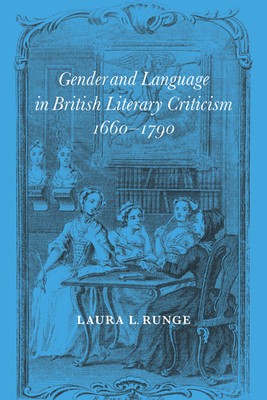
- We will send in 10–14 business days.
- Author: Laura L Runge
- Publisher: Cambridge University Press
- ISBN-10: 0521021456
- ISBN-13: 9780521021456
- Format: 15.2 x 22.9 x 1.4 cm, softcover
- Language: English
- SAVE -10% with code: EXTRA
Gender and Language in British Literary Criticism, 1660-1790 (e-book) (used book) | bookbook.eu
Reviews
Description
During the eighteenth century British critics believed that masculine values represented the best literature while feminine terms signified less important works or authors. Laura Runge argues that an understanding of the language of eighteenth-century criticism requires careful analysis of the gendered language of the era. Her exploration of why, for example, the heroic and the sublime were seen as masculine modes while the novel was viewed as a feminine genre addresses issues central to eighteenth-century studies that are still relevant today.
EXTRA 10 % discount with code: EXTRA
The promotion ends in 15d.18:30:51
The discount code is valid when purchasing from 10 €. Discounts do not stack.
- Author: Laura L Runge
- Publisher: Cambridge University Press
- ISBN-10: 0521021456
- ISBN-13: 9780521021456
- Format: 15.2 x 22.9 x 1.4 cm, softcover
- Language: English English
During the eighteenth century British critics believed that masculine values represented the best literature while feminine terms signified less important works or authors. Laura Runge argues that an understanding of the language of eighteenth-century criticism requires careful analysis of the gendered language of the era. Her exploration of why, for example, the heroic and the sublime were seen as masculine modes while the novel was viewed as a feminine genre addresses issues central to eighteenth-century studies that are still relevant today.


Reviews